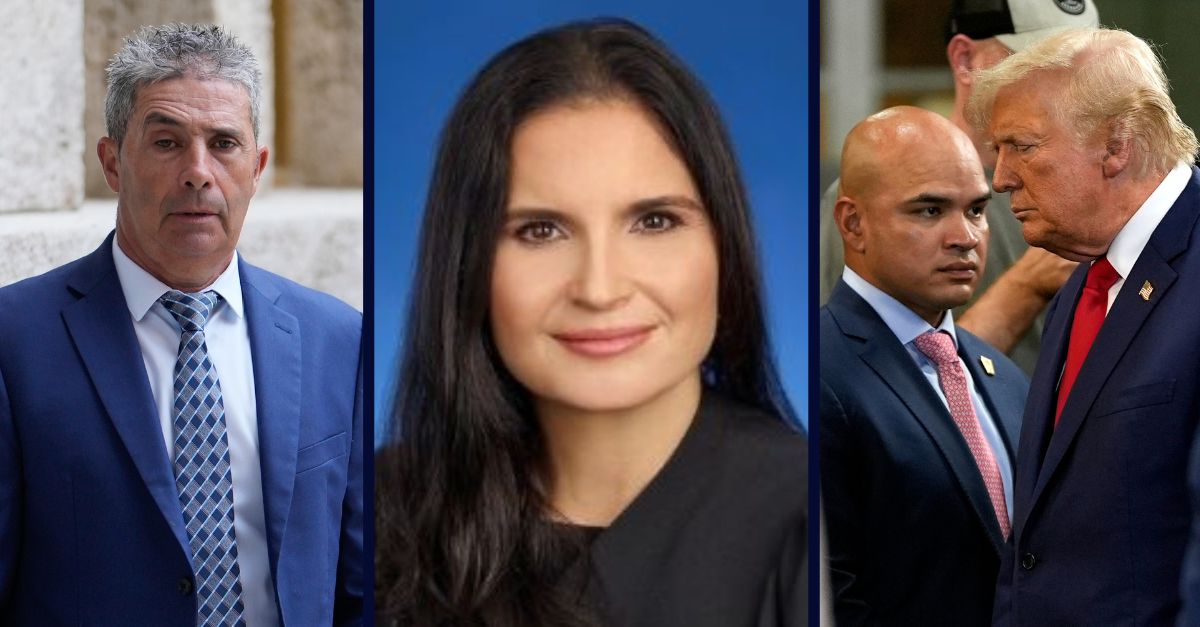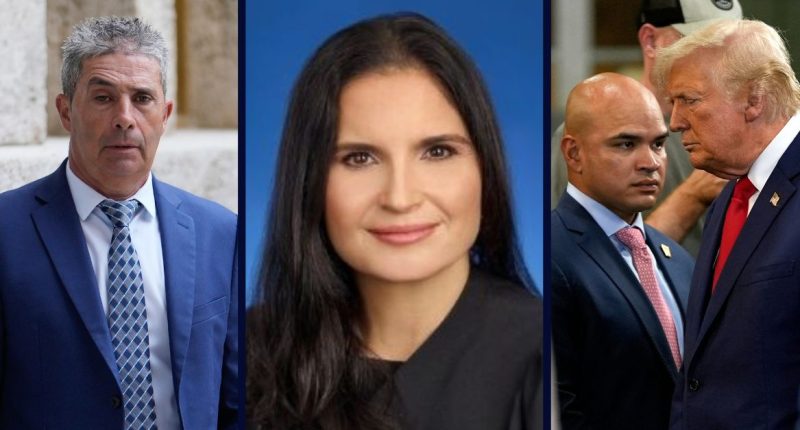
Left: Carlos De Oliveira, property manager of former President Donald Trump’s Mar-a-Lago estates stands on the property grounds, Friday, Feb. 16, 2024, in Palm Beach, Fla. (AP Photo/Rebecca Blackwell). Center: U.S. District Judge Aileen M. Cannon (U.S. District Court for the Southern District of Florida). Right: Republican presidential nominee former President Donald Trump walks past Walt Nauta, personal aide, before a business roundtable at a campaign event at Precision Components Group, Monday, Aug. 19, 2024, in York, Pa. (AP Photo/Julia Nikhinson)
As the battle in Florida over how to handle the remnants of special counsel Jack Smith’s failed criminal prosecutions of Donald Trump limps toward its likely end, lawyers for the president-elect’s Mar-a-Lago co-defendants continue to insist that their clients will suffer if the second volume of Smith’s final report is released — even if the charges against them are dropped.
As Law&Crime has previously reported, the federal cases against Trump have been dropped due to long-standing DOJ policy against indicting and prosecuting a sitting president, even as Smith moved forward with preparing a report about the investigations themselves. That final report comprises two volumes. The first, which was publicly released early Tuesday, relates to his investigation and prosecution of Trump in connection with his alleged efforts to subvert the 2020 presidential election. The second deals with Trump allegedly mishandling classified documents and is still under an order from Cannon preventing its release to certain members of Congress.
On Thursday, lawyers for Nauta and De Oliveira implored Cannon to stand firm on her decision to block the release of that second volume and disregard the government’s promises that a limited release of the report to lawmakers would keep its contents under wraps.
The government’s motivation, the filing says, is purely political.
“The government concedes that the public release of Volume II would be unfairly prejudicial to the two pending codefendants and instead attempts to create a work-around — by referring the pending matter to the U.S. Attorney’s Office to claim that the Special Counsel’s investigation has ‘concluded’; and by arguing to this Court that its proposed conditions adequately insulate against leaks,” the motion says. “But the government’s proposals are insufficient: Where partisan political advantage is at stake, leaking — even subject to whatever congressional oversight that may occur — still results.”
The release of the second volume, the filing insists, “will create irreparable harm to the defendants in this pending criminal matter — a matter the government is welcome to dismiss if its priorities are to provide the public information about its effort to prosecute President Trump and these defendants.”
The disclosure conditions proposed by the government, however, “fail to alleviate the direct, pervasive threat of prejudice and more significantly will leave this Court without recourse should confidential information, or the reactions to or depictions of that information by the would-be designated recipients (including partisan figures who have supported the prosecutive endeavor) enter the public domain,” the filing says.
Lawyers for the steadfast allies of Trump — who is set to be sworn in as the 47th president on Monday — say that Cannon “has the authority to control the flow of information relating to its own criminal trials,” and add that the government “cites no urgency for why the Report must be released now, while the case is still pending.”
The filing continues:
And worse yet, the government declares for the first time that this Court does not have authority to bind the Justice Department in relation to a pending criminal matter initiated in the Department’s name, by an unauthorized Special Counsel. The government’s claim is a remarkable assertion that calls into question the validity of the previously entered protective orders, to which the government had no prior objection throughout the case. The government cannot in good faith suggest that this Court may only bind defense speech and disclosure related to the trial, but may not bind the Justice Department.
“The government used its investigative and law enforcement power to obtain confidential information for use in a federal criminal proceeding, including federal grand jury authority to bring the indictment in this Court,” the filing says. “The government cannot now turn around and say that it is wholly insulated from court intervention when it attempts to use that information for political immediacy rather than prosecutorial purposes.”
The government is complaining, the filing adds, “of problems of its own making.”
Even a limited review of the Mar-a-Lago volume of the report would be inappropriate, the defendants say — in part because lawmakers may not be prohibited from sharing their thoughts on it, even if the review itself is hidden from the public.
“The government says that ‘as a condition of viewing the report,’ [members of Congress] would also have to agree not to share information in Volume Two publicly,’” the filing says. “But it does not prohibit them from sharing their reactions to, or characterizations of, Volume Two, which risks being even more prejudicial than disclosure of Volume Two.”
The filing goes on to say that the DOJ proposed “no conditions whatsoever” regarding sharing the information in the report with congressional staffers “or with other members of Congress, who would not be bound by the Department of Justice’s proposed and unenforceable measures to protect confidentiality.”
“That is the biggest problem with the conditions proposed by the DOJ: There is absolutely no enforcement mechanism as to what Congress does with the information once it is in its possession,” the filing adds, noting that the DOJ was “notably silent on the question whether impactful characterizations of the Report can be shared freely.”
The lawyer says that the government’s acknowledgment that whether the prosecution of Nauta and De Oliveira “will ever proceed is uncertain” amounts to the DOJ speaking “out of both sides of its mouth.”
The fact that the DOJ has signaled that a dismissal of the case obviates any claim of prejudice is proof, the defense lawyers say, that the DOJ’s move is disingenuous.
“The government’s suggestion — that the Report should be released and then the case dismissed when inevitable prejudice occurs — makes a mockery of this Court’s proceedings and reflects an irresponsible approach to the expenditure of taxpayer dollars,” the filing scoffs.
Also on Thursday, lawyers for Trump fired back at DOJ efforts to stop the president-elect from taking part in Friday’s hearing.
Jerry Lambe contributed to this report.







